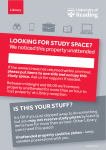 No matter how many essays you’ve written, working on a dissertation or research project can be overwhelming. They can involve lots of new skills from deciding on research questions through to those tricky final citations.
No matter how many essays you’ve written, working on a dissertation or research project can be overwhelming. They can involve lots of new skills from deciding on research questions through to those tricky final citations.
Whatever stage you are at, there is lots of help available from the Library and Study Advice team!
Starting out: Search strategies and finding information
It can be a little daunting starting such a big project so you might want to start with the Study Advice guide on dissertations and major projects or their video on defining your research question.
Once you have sorted your research questions you will need to start researching your topic. Look at the Library subject guide for your department to find key databases in your area. There is also a guide to doing a literature search, the LibLearn tutorials on Blackboard, or you could watch our videos on literature searching if you would like a break from reading!
If you are struggling to find the information that you need then you can contact the Liaison Librarian for your subject.
 Staying on track
Staying on track
Once you have started your research the Study Advice team have some resources to help you keep going. If you are trying to tackle the literature you have found, it might be a good idea to watch their videos on reading academic texts and critical notetaking.
With large projects like dissertations it is easy to feel like you have lots of time left only to find the deadline creeping up on you. When you are trying to balance your dissertation with lectures, other coursework and revision it is easy to fall behind so take a look at the Study Advice video on managing your time to get some tips.
Dissertations and research projects can also be harder to structure than a normal essay due to their size. This Study Advice video on structuring your dissertation has some helpful suggestions to get you started.
Writing up and referencing

When you have a structure in place you will be ready to start writing up. If this seems a little overwhelming take a look at the Study Advice guidance on writing up your dissertation.
As it is a longer piece of writing than you are likely to have written before it is a good idea not to leave your referencing until the last minute – you don’t want to lose precious marks because you ran out of time to format your bibliography! Luckily there is software freely available to help speed this process up. We offer support for EndNote online and Mendeley, which both help to gather your references and automatically create bibliographies. You can check our guidance page to get started or sign up for a workshop.
If you choose to add your citations manually, and are not sure how to reference a particular resource or would like a refresher, there is lots of guidance on the Citing References guide. But don’t forget to check your student handbook for details of the referencing style required by your department.
When you’re finished, you’ll need to get your dissertation printed and bound – the University’s recommended provider is Hollingworth & Moss.
Further help
If you would like more information you can contact your Liaison Librarian or the Study Advice team.
Good luck with your research!
This is one of a series of tips to help save you time and effort finding or using information.
This tip was written by Dr Kim Shahabudin, Study Adviser.
 There are spaces still available on our upcoming EndNote Online and Mendeley workshops for undergraduates and masters students.
There are spaces still available on our upcoming EndNote Online and Mendeley workshops for undergraduates and masters students.


 Try out the archive of Cuban Culture and Cultural Relations now! We have trial access until 22 March.
Try out the archive of Cuban Culture and Cultural Relations now! We have trial access until 22 March.


 As of 18 February the latest round of book moves are complete. All of the books and other materials from the 2nd Floor have been moved to the 4th Floor so that work can start on refurbishing the 2nd Floor.
As of 18 February the latest round of book moves are complete. All of the books and other materials from the 2nd Floor have been moved to the 4th Floor so that work can start on refurbishing the 2nd Floor. No matter how many essays you’ve written, working on a dissertation or research project can be overwhelming. They can involve lots of new skills from deciding on research questions through to those tricky final citations.
No matter how many essays you’ve written, working on a dissertation or research project can be overwhelming. They can involve lots of new skills from deciding on research questions through to those tricky final citations. Staying on track
Staying on track

 As a reminder, our
As a reminder, our 

 We now have access to Kanopy!
We now have access to Kanopy!